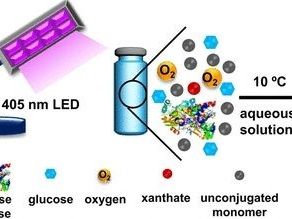Boron based polymers
Advertisement
Plastic bags from polyethylene, packaging from polystyrene, frying pans with Teflon coatings: everyday life is awash with polymers. Chemically, polymers are long, chain-like molecules with backbones based almost exclusively on carbon (and sometimes silicon) atoms. Other types of polymers are rare.

This is how a potential boron polymer could look like: boron atoms shown in green, oxygen atoms shown in red, carbon and hydrogen atoms shown in grey.
Dr. Rian Dewhurst
The team of Chemistry Professor Holger Braunschweig at the Julius-Maximilians-Universität Würzburg (JMU) in Bavaria, Germany, have recently set their sights on the production of polymers based on chains of boron atoms. The as-yet-unknown boron polymers are expected to have highly unusual and useful properties - higher electrical conductance than polymers commonly used in the organic electronics industry being just one example.
Proposal to the DFG finds success
Holger Braunschweig's research proposal to the German Research Foundation (DFG) on this topic was successful: For this goal he will receive 1.5 million Euros from the DFG's Reinhart Koselleck program. This program was created to support particularly innovative and risky projects.
With this funding Prof. Braunschweig hopes to develop efficient synthetic strategies to boron polymers. In this respect it is critical to prevent the boron chains from collapsing in on themselves and forming clusters - a tendency that the element boron is famous for. The research team has come up with five promising strategies to form the desired chains. If successful, they will have discovered a fundamentally new class of materials, the potential applications of which could be immense.
Worldwide recognition as boron expert
The Reinhard Koselleck program of the DFG exclusively funds researchers with exceptional scientific track records. Holger Braunschweig is recognized as a worldwide expert in the chemistry of the element boron. His previous work includes a succession of fundamental breakthroughs in this field - including, among others, the synthesis of the first compound with a triple bond between two boron atoms.
For his work, Braunschweig has been distinguished with two ERC Advanced Grants, each coming with 2.5 million Euro of research funding. In 2009 he also received the 2.5 million Euro Leibniz Prize of the DFG.
Most read news
Topics
Organizations
Other news from the department science

Get the chemical industry in your inbox
By submitting this form you agree that LUMITOS AG will send you the newsletter(s) selected above by email. Your data will not be passed on to third parties. Your data will be stored and processed in accordance with our data protection regulations. LUMITOS may contact you by email for the purpose of advertising or market and opinion surveys. You can revoke your consent at any time without giving reasons to LUMITOS AG, Ernst-Augustin-Str. 2, 12489 Berlin, Germany or by e-mail at revoke@lumitos.com with effect for the future. In addition, each email contains a link to unsubscribe from the corresponding newsletter.




























































